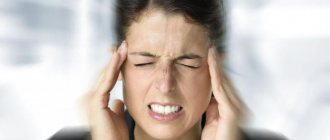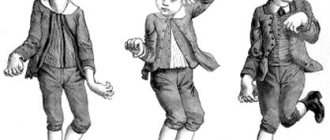Symptoms and manifestations of the syndrome
It is difficult to determine asthenic-depressive syndrome due to its extensive symptoms. A person suffering from an illness may be tormented by all the symptoms at once or only some of them - those that can easily be attributed to simple fatigue. Typically, symptoms are expressed in a person’s depressed state:
- loss of interest in life (you don’t want to go anywhere, you’re not interested in anything, etc.);
- irritability and aggression over minor trifles;
- difficulties in finishing what you started;
- rapid changes in mood (apathy is abruptly replaced by fussiness and uncontrollable talkativeness);
- it is difficult to concentrate on one thing;
- various phobias appear that have not previously been observed in this person (fear of crowds, claustrophobia, etc.);
- attacks of unreasonable fear and panic;
- lack of appetite or, on the contrary, irrepressible gluttony.
Astheno-depressive health is often accompanied by a disturbance in sleep patterns: it is difficult for a person to fall asleep, but it is even more difficult to wake up and get out of bed, even after many hours of sleep.
Physiological symptoms are as follows:
- headache;
- attacks of tachycardia;
- shortness of breath and sweating;
- dizziness and nausea;
- low-grade fever;
- menstrual irregularities;
- impotence;
- gastrointestinal disorders.
Some people experience so-called mythical body pains. False syndrome torments different parts of the body and joints each time.
Astheno-depressive syndrome affects not only adults, but also children. Parents need to pay attention to the following symptoms:
- the child’s isolation and unsociability;
- sudden weight loss;
- changes classes every half hour;
- may stay up all night or suddenly fall asleep while playing your favorite game.
Children's astheno-depressive disease is usually associated with excessive mental stress, lack of mobility and lack of walks in the fresh air.
Anxiety-depressive syndrome
It is generally accepted that anxiety-depressive syndrome is one of the main diseases of our time due to an active lifestyle. Often a person begins to sacrifice rest time in order to solve as many everyday problems as possible, which often leads to nervous exhaustion.
Among the most common phenomena are: melancholicity, apathy, tearfulness, emotional depression. Anxious feelings are often accompanied by a constant feeling of fear. According to statistics, most people suffering from anxiety constantly experience various experiences, which leads to nervous breakdowns.
There are several reasons why anxiety-depressive syndrome may develop:
- Stable course of the disease
- Hereditary factor
- Constant work of the body “for wear and tear”, which leads to severe fatigue
- Decreased serotonin production
- Use of a number of medications.
The main sign of the development of the syndrome is constant anxiety without good reason. Aggression, irritability and tearfulness are often observed as side symptoms. The person is unable to carry out daily activities at a normal pace. It is important to note that any thought about the future is accompanied by negativism. The patient is sure that it will only get worse and there is no improvement in his condition.
It is important to prevent the development of a chronic form, since this often leads to problems in all areas of human activity.
Causes of the syndrome in adults
In order to take timely measures to treat depression and prevent a person from deepening into depression, it is necessary to understand the true reasons for his depressed state. This is problematic to do, since the “roots” of the problem, like the symptoms, have too large a radius:
- hereditary predisposition to mental disorders;
- head injuries, even those that were not considered important;
- the presence of obvious and hidden chronic diseases;
- stress and psycho-emotional shocks;
- mental fatigue and lack of sleep;
- violations of occupational hygiene;
- depletion of the body due to vitamin deficiency;
- intoxication of the body (nicotine and alcohol, as well as medications).
Recently, experts have noted the spread of asthenic-depressive illness, the causes of which lie in the modern lifestyle:
- the pursuit of the blessings of life, the desire to do everything: provide for yourself and your family “to the fullest”, keep abreast of all events, keep up with fashion, etc.;
- inflated demands and expectations from the environment, which a person strives to meet at any cost;
- fear of losing your job, apartment, family;
- a large flow of news supplied by the media, the Internet, and other people.
Being under such daily pressure, sooner or later a person “breaks down”. His “mad” activity gives way to apathy, and a neurasthenic syndrome develops, threatening to turn into deep depression.
It is important to understand in time and not to trigger the syndrome. It can be difficult for a person to adequately assess his own astheno-depressive situation. He becomes grumpy, hates the whole world and believes that he is being picked on too much. Many people brush this problem aside. But blues is also a disease and it needs to be treated as early as possible.
Causes and provoking factors
The state of asthenia is a signal from the nervous system that its cells are depleted, for example, due to excessive consumption of energy potential to fight the disease, to replenish costs due to toxic effects, or the lack of additional nutrition for the cells.
This may not only be a sign of overwork, but also a mental disorder or physical illness.
Psychotherapists believe that asthenic-depressive syndrome is characteristic of any modern person who lives with the goal of doing everything, using every minute to advance in his career, or in pursuit of a “better life.”
The constant desire to achieve at any moment can give way to apathy and then the syndrome of neurasthenia develops, followed by depression. The transition may not be noticeable. A person begins to grumble, take offense, make claims, complain.
Most susceptible to developing the syndrome:
- participants in the liquidation of the Chernobyl accident,
- residents of environmentally polluted areas;
- patients after surgery, radiation and chemotherapy;
- chronic patients with inflammatory diseases;
- service sector workers who are exposed to excessive emotional and mental stress.
Risk factors for astheno-depressive syndrome:
- areas with high radiation, environmentally polluted areas;
- actions that weaken the body's resistance: surgery, anesthesia, chemotherapy, chronic diseases, ionizing radiation (computers);
- monotonous and stressful work;
- lack of physical activity, lack of sports activities;
- excessive and unbalanced nutrition;
- lack of optimism and life goals.
Diagnostics
If a person has astheno-depressive syndrome, he needs to consult a therapist, take tests and undergo an examination. Often it all starts with physical ailments. The doctor will help you find out chronic diseases as a possible root cause:
- pathological enlargement of the thyroid gland;
- hormonal imbalance;
- diabetes;
- hepatitis;
- tachycardia, etc.
If no serious illnesses are identified, the root of the problem lies in psycho-emotional disorders. Then you should contact a psychologist. The specialist will analyze the astheno-depressive phenomenon, study the life history, determine the degree of the syndrome and prescribe treatment, medication or in the form of psychotherapeutic sessions.
Risk group
- People suffering from chronic inflammatory diseases: gastritis, duodenitis, cholecystitis, nephritis.
- Representatives of the mass intelligentsia and creative professions: doctors, teachers, journalists, constructors, designers, directors.
- People holding high management positions: their work activities are associated with high nervous stress and great responsibility.
Astheno-depressive syndrome poses a significant danger to a person’s mental health. And not so much because in most cases it becomes a source of decreased performance and social activity, but because ignoring it can lead to the development of more complex and deeper ones. The syndrome requires certain treatment.
Antidepressants
Modern drug treatment is very effective in cases of various types of depression and emotional depression. But for this method to be successful, two conditions must be met:
1. Exclude physiological causes of the disease (otherwise taking antidepressants will be pointless). 2. Do not self-medicate. The choice of product and dosage are recommended by a medical specialist.
The attitude of the person himself towards the prescribed treatment is also important. He should know that pills are not a panacea, but only a means of suppressing the syndrome. Over time, addiction to antidepressants occurs, and if by the end of drug treatment you do not develop tactics to prevent further attacks, it will be in vain.
Antidepressants can bring a person out of astheno-depressive syndrome so that he can adequately reconsider the reasons that led him to a depressed state. During this “respite” you need to act: streamline your daily routine, introduce a diet, start playing sports.
Treatment of depressive syndrome
It is important to note that depressive syndrome is classified as a group of mental and personality disorders. To combat the disease, it is necessary to use effective drug therapy. Complex work involves the following activities:
- Use of tranquilizers, sedatives, antipsychotics, antidepressants
- Conducting psychotherapeutic sessions and further examination by a psychotherapist
- Creating comfortable living conditions. If necessary, the patient can change his social circle, place of residence and work
- Normalize a healthy lifestyle: sleep 6-8 hours, monitor your diet, normalize your daily routine
- The use of physiotherapeutic methods, art therapy.
As the disease progresses, the patient may experience hallucinations and antipsychotic medications.
Diet
Astheno-depressive breakdown can be treated with diet. Sometimes you don’t need depressants, it’s enough to establish a healthy diet. As with any health diet, it is advisable to completely avoid fatty foods. It is more than replaced by “energy” products:
- porridge;
- nuts;
- dried fruits;
- legumes
There must be proteins in the form of lean meat and eggs, vitamins, and dairy products.
During the blues, many people “eat up” their bad mood with sweets. Women are especially guilty of this. This cannot be done. Fats weigh down the stomach and cause worsening asthenic-depressive conditions. A piece of dark chocolate won't do any harm. But it is better to eat a few pieces of dried apricots, dried banana or pineapple. It will be both more useful and effective.
Sport
Treatment with physical activity gives excellent results. The syndrome of psycho-emotional depression, that is, astheno-depressive, often has hypodynamic causes. There is no need to immediately start intensive sports activities. But a gradual increase in activity is mandatory:
- Get into the habit of walking before bed. First half an hour. Then one hour. After a while you will want to walk faster, more rhythmically, and even run. Jogging is one of the best methods to banish the blues.
- Sign up for swimming or dancing. Water or rhythmic movements to music are the most powerful natural antidepressants.
- Study a couple of complexes of therapeutic exercises for the back and the whole body, especially if the work is sedentary, and do the exercises in the morning or during breaks. In the fight against the syndrome, breathing exercises or yoga will be useful.
Any sport, be it cycling, aerobics or other activities, should bring pleasure and the feeling that you are breathing deeply. This will definitely help in treatment and increase vitality.
To prevent astheno-depressive syndrome, you can use a variety of techniques: auto-training, herbal medicine, aromatherapy, adherence to a work-rest regime. All this can increase self-esteem and vitality.
Similar syndromes:












